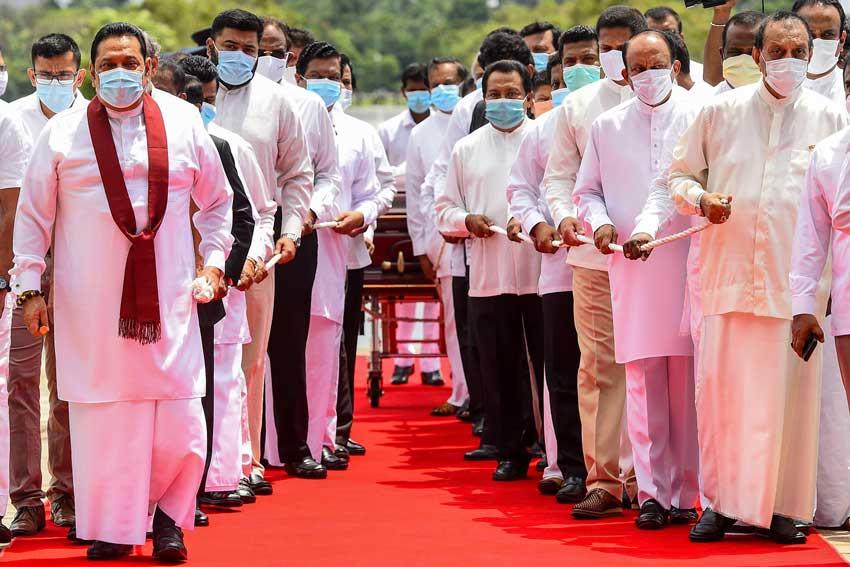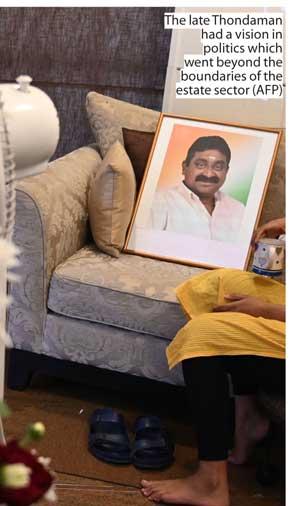Reply To:
Name - Reply Comment

The scores of politicians representing all races and coming from all walks of life to attend his funeral showed that Thondaman’s name was solidly written down in the annals of Sri Lankan politics (AFP)
This was probably because Thondaman was a politician and not a trade union activist
One occasion when Thondaman showed his prowess was when he crushed a rebellion with the congress
Thondaman had a bigger role to play than sticking merely with the Tamil Estate labourers’ salary issue
 The death of Minister Arumugam Thondaman (56) a few days ago is sure to affect the struggle of Tamil estate workers to survive the 30 days of the month. The living conditions in tea estates is appalling to say the least. The late minister was part of discussions with plantation companies or Gotabaya Rajapaksa; when the latter was bidding for presidency last year, in attempts to raise the living conditions of estate workers.
The death of Minister Arumugam Thondaman (56) a few days ago is sure to affect the struggle of Tamil estate workers to survive the 30 days of the month. The living conditions in tea estates is appalling to say the least. The late minister was part of discussions with plantation companies or Gotabaya Rajapaksa; when the latter was bidding for presidency last year, in attempts to raise the living conditions of estate workers.
Whether he was successful or not in attempts to obtain a decent daily wage for workers is debatable. There were of course unions , backing the workers, which had clout; sometimes showing more promise than the minister when batting for these hapless plantation workers.
Even to write down the four figure amount (Rs 1000) on a placard and carry it during protests needs not only guts, but also the backing of a politician. The Tamil workers saw Thondaman in their ‘battlefield’ but whether he would have offered a shoulder for them to lean on was a big question mark.

This was probably because Thondaman was a politician and not a trade union activist. There were even accusations against Thondaman that he had treacherous backdoor deals with tea companies to intensify the exploitation of estate workers.
Thondaman had the field set before him to take to politics. His grandfather Saumyamoorthy Thondaman was the founder of the Ceylon Workers’ Congress. When Thondaman (Arumugam ) began his career as a politician he was given many positions within the congress and as a result many members within the organisation showed their displeasure. One occasion when Thondaman showed his prowess was when he crushed a rebellion with the congress. Many members, including six parliamentarians came together to form a group within the congress, but the late minister quashed it.
Thondaman followed the political developments in the island very closely. He knew he could serve the Tamil community if he was in power. Past records show that though he started his career with the United National Party (UNP) he later switched alliances with the Peoples Alliance and later with the Sri Lanka Podujana Peramuna (SLPP); going on to back Gotabaya Rajapaksa at the last presidential elections. However there were Tamil politicians like Palani Digambaran who thought that Sajith Premadasa would win the race for the presidency. This split the Tamil vote at the last presidential elections.
This division or split in thinking within the Tamils didn’t make it easy for Thondaman to continue with his political career. We have heard that he brought individuals like Faizer Mustapha and Vadivel Suresh into politics and gave them positions in the congress. However, they later left Thondaman and went their different ways in the field of politics. For the record his son Jeevan is expected to contest the upcoming parliamentary elections while his relation Senthil is tipped to take over the reins of the congress as its leader.
Thondaman had his education at Royal College Colombo, hence he grew up in a multi-ethnic community. When he moved to the plantations he saw a divided community; the ideal ground to set foot and engage in politics.
Another factor which was hard for him was that his ally in politics Mahinda Rajapaksa was not popular with the Tamils. This was because Rajapaksa (Now the Premier in the present caretaker regime) was the country’s president during the height of the war; when many innocent Tamils were killed as a result of fighting between Tamil tiger separatists and Government security forces.
He was also an important cog in the Rajapkasa political circle. Given that Sri Lanka is a politically sensitive nation to neighbouring India, the super power wants some influence in this country. One of the crucial factors of importance for India is the Sri Lankan Tamil estate workers’ welfare. Any hope that these estate workers had in obtaining Indian citizenship was sent into oblivion with the Indian Government excluding the Sri Lanka Tamil with Indian roots from gaining any benefit from the recently passed Citizenship Amendment Act.
Thondaman constantly maintained that Sri Lanka estate workers needn’t be included in the citizenship legislation. He had said that Tamils in Sri Lanka needn’t fear. He had said during an interview with ‘India Today’ that “citizenship legislation is for minorities from “friendly” and “neighborhood” nations but Sri Lankan Tamil refugees needn’t have been included in it since “they are family”.
Thondaman had a bigger role to play than sticking merely with the Tamil Estate labourers’ salary issue. He was a government minister and the point man of the present regime, or the Rajapaksa’s when it came to dealing with India’s interest in the welfare of Tamil estate workers. Just prior to the day he passed way, Thondaman had spent some time at the office of the Indian High Commissioner Gopal Gajlay discussing plans by the Modi Government to build 100,00 more houses within the estate Tamil community and bilateral cooperation between the two countries among other things.
We can’t dismiss Thondaman as a political stooge. Though he supported Gotabaya Rajapaksa during the run-up to the presidential elections he put down 32 conditions from the congress to be implemented in Rajapkasa’s manifesto. One was the wage increase for estate workers. He broke the trend of these estate workers having a history of backing the green party. He changed this when he teamed up with Chandrika Kumaratunga at the 2000 parliamentary elections and worked with the People’s Alliance. His was always a peaceful struggle. He was a key figure in implementing the 17th Amendment to the Constitution where the identity of the Tamil worker with Indian roots was enhanced.
He switched alliances with the UNP again before settling down to do politics with the Rajapaksas with the advent of Mahinda Rajapaksa taking over as president in 2005. One good thing that transpired with the close relationship he had with the Rajapaksas was that the estate youth was able to see beyond tea plucking and work towards stepping into careers like teaching, medicine and administration thanks to national programmes that were carried out. He teamed up with Basil Rajapaksa and obtained many benefits for estate workers through Gama Neguma and Maga Neguma programmes. Another factor which needs to be underscored is that during the time he worked with the Rajapaksas the suicide rate within the estate community dropped drastically.
The late Thondaman had a vision in politics which went beyond the boundaries of the estate sector. One can say that his attention was divided because there were so many factors influencing his existence as one of the representatives of the Tamil people in the parliament. He was wellset within the Rajapaksa political circle and held the ministerial post of Cabinet Minister of Community Empowerment and Estate Infrastructure Development at the time of his death. The scores of politicians representing all races and coming from all walks of life to attend his funeral showed that Thondaman’s name was solidly written down in the annals of Sri Lankan politics.